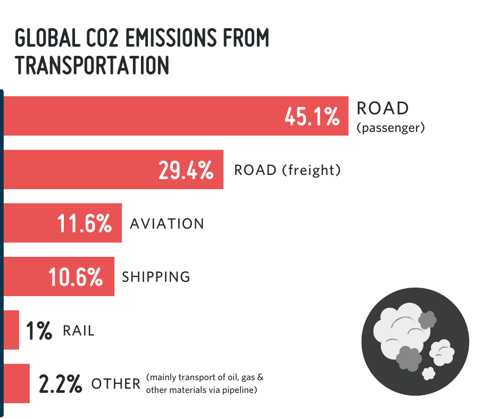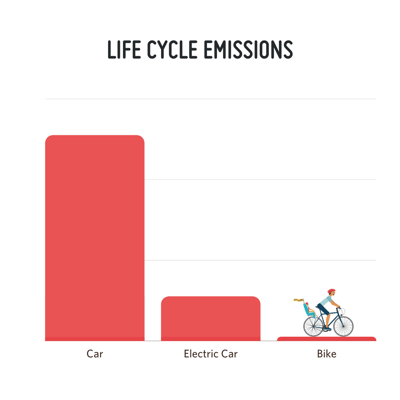You may think there wasn’t a lot of good news in the 3,900-page IPCC report released in August. But we did find out that there is still time to avert the worst-case scenarios, and we have a 2-wheeled solution that can have a significant impact.
Why are bikes so important?
Meeting greenhouse emission reduction targets will involve a global effort to move away from motorized vehicles. Transportation accounts for 24% of global emissions - when you break it down 'road passenger transport' is the biggest emitter, more so than freight, aviation, or shipping.

Thankfully, even small changes to individuals’ habits can have a big impact according to a new study from the University of Oxford’s Transport Studies Unit.
By following nearly 2,000 urban dwellers over time, they found people who switch ‘just one trip per day from a car to a bike, reduce their carbon footprint by about 0.5 tonnes over a year, representing a substantial share of average per capita CO2 emissions,’ says the lead researcher, Oxford’s Dr. Christian Brand. ‘If just 10% of the population were to change travel behavior, the emissions savings would be around 4% of lifecycle CO2 emissions from all car travel.’
Dr. Brand says, ‘Our findings suggest that, even if not all car trips could be substituted by bicycle trips, the potential for decreasing emissions is huge.’
Researchers found active travel substitutes for motorized travel – and increases in cycling, e-biking or walking over time independently lowers mobility-related lifecycle CO2 emissions. And swapping the car for a bike or e-bike for just one day a week – or going from ‘not cycling’ to ‘cycling’ – drastically lowers mobility-related lifecycle CO2.
The largest benefits were gained when people shifted from car to active travel for business purposes, social and recreational trips, and commuting to work or place of education. Their findings suggested that even if people couldn’t switch all their car journeys, the potential for decreasing emissions is huge.
This is great news, because we know that replacing all car journeys would be great...but it’s simply not practical for many people. The 10% figure is much more achievable.
Reducing Life Cycle Carbon Emissions
When taking into account the production, fueling, and disposing of a vehicle, the study found that ‘emissions from cycling can be more than 30 times lower for each trip than driving a fossil fuel car, and about ten times lower than driving an electric one’.

While electric cars have much lower emissions in their lifetime than petrol and diesel cars, in the short term they do cause quite a bit of CO2 to be emitted from mining the raw materials for their batteries, manufacturing them, and generating the electricity that powers them produces emissions.
Compare that to getting the people who already own a bike to start to ride it for some of their transportation trips and we have a climate change solution that has a net carbon saving from the start.
With a Love to Ride program you can take advantage of an existing and proven technology that uses behavior change theories and techniques to achieve lasting change in your community. We’ll give you the tools you need to get a wider range of people on bikes and even increase the distances they are confidently able to ride for transportation purposes.
Let’s get more people enjoying all the benefits of riding bikes and help save our planet. 🌎
Privacy policy
All rights reserved. Copyright 2021